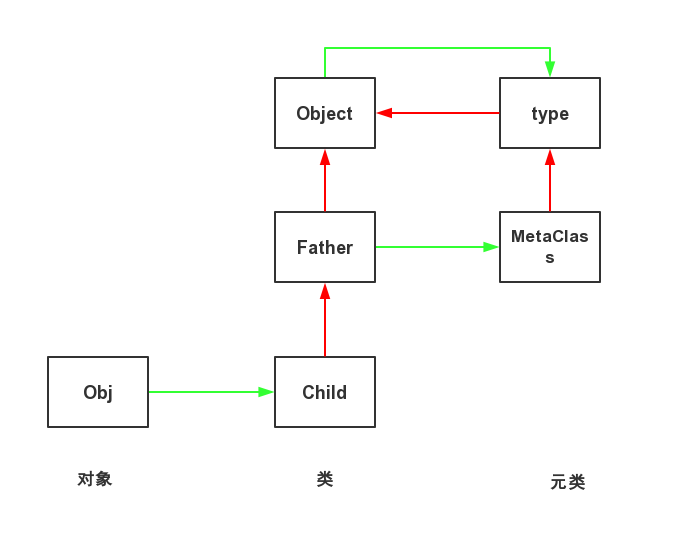元类 (metaclass) 是创建类的类,类是元类的实例,只有 type 及其派生类才可能充当元类。正如我们要先创建一个类,然后才能创建实例,我们先要创建元类,然后才能创建类。
好吧上面这段话确实很绕,下面我们一步一步来看
首先在 Python 中类也是一个对象
class A(object):
pass
由于类也是一种对象(类可以称为类型对象),所以它们也是通过什么东西来生成的。
In [3]: a = A()
In [4]: a.__class__
Out[4]: __main__.A
In [5]: a.__class__.__class__
Out[5]: type
答案是 type object is the base of every object, type is the class of every type
那 type 的类型又是什么呢
In [10]: type(type)
Out[10]: type
type 的类型就是他自身
type 比较特殊。它不只可以查看对象的类型,还可以接受一个类的描述作为参数,然后返回一个类
Parent = type('Parent', (object,), {'bar': 1})
def echo(self):
print self.bar
Child = type('Child', (Parent,), {'echo': echo})
child = Child()
child.echo()
type 的参数依次为:
- 类名;
- 继承的父类集合;
- 包含属性的字典;
但这种方法没有使用 class 关键字定义类来的直观
到这里,我们再来回想本文的开始处所讲:元类是用来创建类的。type 实际上就是一个元类,Python 使用 type 作为元类来创建所有的类。
元类实际上控制了类的创建行为,所以我们可以通过元类在类的创建时进行修饰。
可以使用 metaclass 关键字指定自定义元类
class UpperAttrMetaclass(type):
def __init__(cls, name, bases, attrs):
print 'metaclass __init__'
super(UpperAttrMetaclass, cls).__init__(name, bases, attrs)
def __call__(self, *args):
print 'metaclass __call__', args
# return type.__call__(self, *args)
return super(UpperAttrMetaclass, self).__call__(*args)
def __new__(cls, name, bases, dct):
print 'metaclass __new__'
uppercase_attr = {}
for name, val in dct.items():
if not name.startswith('__'):
uppercase_attr[name.upper()] = val
else:
uppercase_attr[name] = val
# return type.__new__(cls, name, bases, uppercase_attr)
return super(UpperAttrMetaclass, cls).__new__(cls, name, bases, uppercase_attr)
# For Python3
# class A(metaclass=UpperAttrMetaclass):
# pass
class A(object):
__metaclass__ = UpperAttrMetaclass
def __init__(self, bar):
print('A __init__')
self.bar = bar
def echo(self):
print(self.bar)
print 'Create Instance'
a = A(6)
b = A(12)
if hasattr(a, 'echo'):
print 'instance has echo'
elif hasattr(a, 'ECHO'):
print 'instance has ECHO'
else:
print 'instance has nothing'
Output
metaclass __new__
metaclass __init__
Create Instance
metaclass __call__ (6,)
A __init__
metaclass __call__ (12,)
A __init__
instance has ECHO
UpperAttrMetaclass.__new__是用来生成类A的类型对象, 我们可以在调用type.__new__之前更改 dct 变量来对类A进行修饰.
UpperAttrMetaclass.__init__是在生成类A的类型对象后被调用进行初始化. 第一个参数是已经生成的类A的类型对象.
UpperAttrMetaclass.__call__是在生成类A的实例对象时被调用的, 通过调用type.__call__可以生成该实例对象obj, 之后我们可以直接修改obj来实现实例对象的自定义.
元类的__init__和__new__只在创建类A时调用一次,而创建A的实例时,每次都会调用元类的__call__方法
Python 在创建类的过程中,会在类的定义中寻找__metaclass__,如果存在则用其创建类,否则使用内建的 type 来创建类。对于继承的情况,如果当前类没有找到,会继续在父类中寻找__metaclass__,直到所有父类中都没有找到才使用 type 创建类。所以元类可以隐式地继承到子类,但子类自己却感觉不到
class A(object):
__metaclass__ = UpperAttrMetaclass
def __init__(self, bar):
print('A __init__')
self.bar = bar
def echo(self):
print(self.bar)
class B(A):
pass
Output
metaclass __new__
metaclass __init__
metaclass __new__
metaclass __init__
元类可以用来干很多事,比如单例模式
class Singleton(type):
def __init__(self, *args, **kwargs):
self.__instance = None
super(Singleton, self).__init__(*args, **kwargs)
def __call__(self, *args, **kwargs):
if self.__instance is None:
self.__instance = super(Singleton, self).__call__(*args, **kwargs)
return self.__instance
else:
return self.__instance
class A(object):
__metaclass__ = Singleton
class Achild(A):
pass
a1 = Achild()
a2 = Achild()
print id(a1) == id(a2)
# True
为了彻底搞懂,再来看一个例子
abc 是 Python 的一个内建库,用于模拟抽象基类(Abstract Base Classes)。开发者可以使用 abc.abstractmethod 装饰器,将指定了元类为 abc.ABCMeta 的类的方法定义成抽象方法,同时这个类也成了抽象基类。
from abc import ABCMeta, abstractmethod
class A(object):
__metaclass__ = ABCMeta
@abstractmethod
def method(self, bar):
pass
a = A()
Output
Traceback (most recent call last):
File "test.py", line 12, in <module>
a = A()
TypeError: Can't instantiate abstract class A with abstract methods method
我们来看一下这个是如何实现的 abc.py 在/usr/lib/python2.7目录中
def abstractmethod(funcobj):
"""A decorator indicating abstract methods.
Requires that the metaclass is ABCMeta or derived from it. A
class that has a metaclass derived from ABCMeta cannot be
instantiated unless all of its abstract methods are overridden.
The abstract methods can be called using any of the normal
'super' call mechanisms.
Usage:
class C:
__metaclass__ = ABCMeta
@abstractmethod
def my_abstract_method(self, ...):
...
"""
funcobj.__isabstractmethod__ = True
return funcobj
abstractmethod装饰器给类中的方法添加了__isabstractmethod__ = True
class ABCMeta(type):
"""Metaclass for defining Abstract Base Classes (ABCs).
Use this metaclass to create an ABC. An ABC can be subclassed
directly, and then acts as a mix-in class. You can also register
unrelated concrete classes (even built-in classes) and unrelated
ABCs as 'virtual subclasses' -- these and their descendants will
be considered subclasses of the registering ABC by the built-in
issubclass() function, but the registering ABC won't show up in
their MRO (Method Resolution Order) nor will method
implementations defined by the registering ABC be callable (not
even via super()).
"""
# A global counter that is incremented each time a class is
# registered as a virtual subclass of anything. It forces the
# negative cache to be cleared before its next use.
_abc_invalidation_counter = 0
def __new__(mcls, name, bases, namespace):
cls = super(ABCMeta, mcls).__new__(mcls, name, bases, namespace)
# Compute set of abstract method names
abstracts = set(name
for name, value in namespace.items()
if getattr(value, "__isabstractmethod__", False))
for base in bases:
for name in getattr(base, "__abstractmethods__", set()):
value = getattr(cls, name, None)
if getattr(value, "__isabstractmethod__", False):
abstracts.add(name)
cls.__abstractmethods__ = frozenset(abstracts)
# Set up inheritance registry
cls._abc_registry = WeakSet()
cls._abc_cache = WeakSet()
cls._abc_negative_cache = WeakSet()
cls._abc_negative_cache_version = ABCMeta._abc_invalidation_counter
return cls
# 省略部分方法
可以看到ABCMeta.__new__将所要修饰的类与其抽象父类中的__isabstractmethod__为True的方法都添加到abstracts这个集合中,并添加了__abstractmethods__这个属性,然后返回修饰完成的类
from abc import ABCMeta, abstractmethod
class A(object):
__metaclass__ = ABCMeta
@abstractmethod
def say(self):
pass
@abstractmethod
def hi(self):
pass
class B(A):
@abstractmethod
def bye(self):
pass
print B.__abstractmethods__
Output
frozenset(['bye', 'say', 'hi'])
2016.12.15 另外补充一下关于 Python 查找顺序的问题

实例的属性查找可归结:先在自己的空间查找,若没找到则到对应类空间去查找,并一路向上直至object 类的属性查找稍稍复杂一点:先在自己的 mro 上查找,若没找到再到元类的类空间查找
注意
Python mro 中的类的元类必须有继承关系
class Meta1(type):
m = 1
class Meta2(type):
m = 2
class A(object):
__metaclass__ = Meta1
class B(object):
__metaclass__ = Meta2
class C(A, B):
pass
Traceback (most recent call last):
File “mro.py”, line 13, in